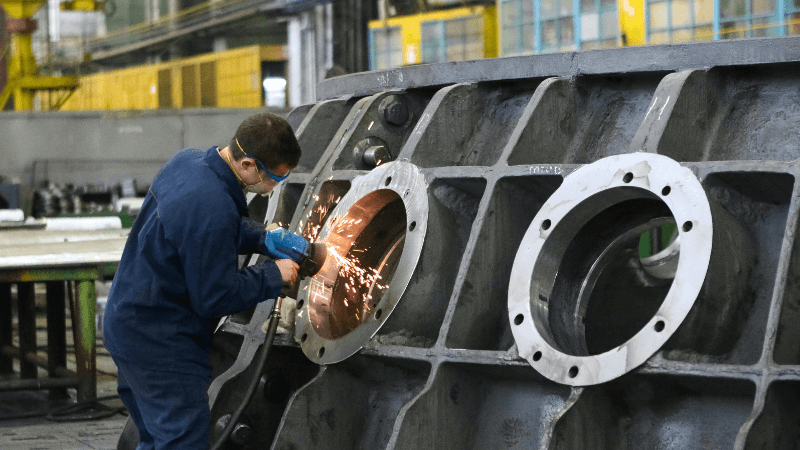In today’s ever-evolving landscape of economic uncertainties, ranging from global health concerns and supply chain complexities to nationwide labor shortages, businesses of all scales are feeling the impact. This ripple effect encompasses not just executive leadership teams but also extends to the frontlines where dedicated workers ensure the operational wheels keep turning. While the spotlight often falls on leadership making data-driven decisions from remote corporate offices, it’s the frontline workers who are at the center of these operations. They are the unsung heroes responsible for delivering shipments, packaging products, managing warehouse orders, and upholding the service quality customers expect. Hence, it’s imperative to provide these frontline employees with the tools and resources they need to thrive in their roles.
Enter the era of artificial intelligence (AI) solutions. A recent study by the Boston Consulting Group (BCG) reveals that AI adoption has surged, with companies using AI soaring from 22% in 2018 to a remarkable 50% in 2023. This shift underscores the urgency of embracing new technological avenues. Astonishingly, the BCG report highlights that while 80% of leaders actively use AI, only 20% of frontline workers have engaged with the technology. This disparity paints a clear picture – leaders embracing AI are reaping benefits, while frontline workers remain fearful that AI will replace their jobs.
We’re here to tell you, that isn’t the case. AI is about enhancing and elevating the roles frontline employees are already performing. In this article, we delve into the ways AI can enhance productivity, efficiency, and overall work environments for these individuals. We’ll highlight how it’s not about taking over their responsibilities; it’s about empowering them to excel by introducing a suite of innovative tools that augment their existing skill sets. Integrating AI into frontline work is an avenue to enrich their capabilities, ultimately granting them more time to focus on innovative initiatives and delivering customer-centric experiences.
Harnessing AI to elevate frontline employee performance
In today’s fast-paced business landscape, frontline workers hold the key to seamless operations, making it essential to empower them with cutting-edge tools. Leveraging Artificial Intelligence (AI), organizations are revolutionizing the way frontline employees interact with daily tasks, significantly boosting productivity and efficiency. AI’s impact spans diverse areas, from customer service and inventory management to predictive analysis and process optimization, contributing to enhanced teamwork and overall operational excellence. AI-driven automation has the power to redefine frontline operations, unleashing benefits such as:
- Streamlined Tasks: Mundane tasks like inventory management can be automated, freeing up frontline staff to focus on critical customer interactions.
- Boosted Productivity: Automation enables employees to accomplish more within shorter timeframes, reducing operational costs and driving productivity gains. For example: In big-box retail environments, AI can design floor plans and suggest product placement based on customer preferences and shopping patterns in order to save employees time. Or, AI can delegate work to employees based on their unique proficiencies to reduce operational friction and bolster productivity.
- Informed Decision-Making: Advanced algorithms analyze customer behavior in real-time, providing staff with insights and recommendations for enhanced customer engagement including personalized customer recommendations. In retail stores, AI can better inform staff of what products are projected to be in demand so they can cater to that shopping experience.
- Improved Communication: AI-powered platforms serve as centralized hubs, fostering better communication among staff members, ensuring everyone stays on the same page, and enhancing teamwork.
Organizations worldwide are integrating AI to supercharge performance:
- Process Improvement: AI detects anomalies in production processes, predicting future issues and proactively prescribing production operators with the steps they should take to maintain product quality.
- Machine Efficiency: Real-time insights into machine conditions empower workers to proactively address concerns before a breakdown occurs. AI monitors equipment conditions, predicts anomalies, and suggests maintenance actions, optimizing equipment performance and reducing the downtime caused by overdue repairs.
- Operations Monitoring: Automated machine vision releases operators from manually monitoring the floor, enabling them to focus on value-driven tasks like process optimization.
- Project Management: AI with Natural Language Processing enhances cross-language project communication, promoting collaboration among international or bilingual teams.
In the evolving digital landscape, AI’s integration equips frontline workers with tools that transcend routine tasks, fostering creativity, and collaboration. The newfound efficiency not only empowers employees but also strengthens cross-functional teams, paving the way for a more resilient and productive future.
Transforming challenges into opportunities
Frontline employees, who play a pivotal role in daily operations, often grapple with demanding tasks and a lack of access to resources. This digital divide between office workers and those on the frontline can lead to disparities in skill sets and job satisfaction.
AI steps in as a game-changer, offering solutions that enhance the efficiency and effectiveness of frontline employees’ daily tasks while alleviating some of the challenges. AI can handle routine and mundane tasks, allowing frontline employees to focus on value-add activities such as improving customer experiences, engaging in creative initiatives, or increasing production to surpass incentivized goals. Chatbots can provide instant responses to common employee inquiries regarding pay, benefits packages, or provide quicker time-off request approvals as AI can confirm shift coverage. Or, advanced AI algorithms can analyze employee behavior, giving frontline workers valuable insights into their performance and helping them focus on areas of improvement in addition to capitalizing on their unique proficiencies.
By leveraging AI solutions, organizations can drive efficiency, reduce burnout, and create a more inclusive work environment for their frontline employees, ultimately leading to improved customer experiences and business success. As industries adapt to uncertainties, AI’s potential in empowering frontline workers stands out as a transformative force. By integrating AI into daily operations, organizations can enhance efficiency, boost productivity, and redefine the frontline experience. This evolution isn’t just about technology; it’s about harnessing the power of innovation to empower those who form the backbone of businesses.
AI tools to listen and engage employees
Supercharge your ability to collect, analyze, and act on employee feedback with WorkStep’s AI technology.
Tom Goyette, Product Marketing Manager | tom.goyette@workstep.com
Tom Goyette is a Product Marketing Manager at WorkStep. With experience in start-up and enterprise level SaaS and eCommerce organizations, Tom excels at managing and creating content, marketing, and analytics. Tom believes people are at the center of every great organization and is eager to share stories that highlights the value of the employee voice.



